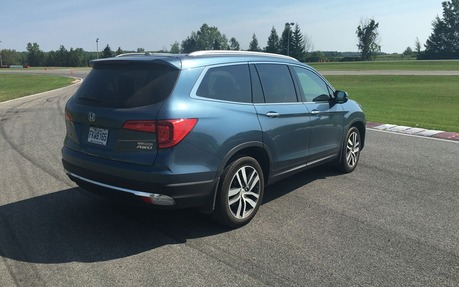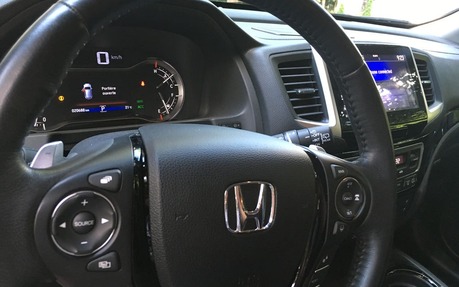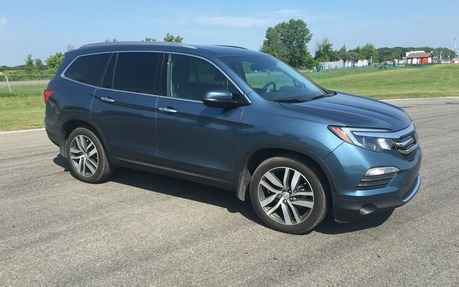2016 Honda Pilot Touring: Minivan Killer
As a father of three toddler-aged boys, a minivan was somewhat of a necessity for me. The amount of space that baby seats, buckets, baby bags and all the other equipment required to support a family of this size make a minivan a must-have item.
Unfortunately, there is a negative stigma associated with these family haulers, and many people simply dislike them because they aren’t considered cool. Personally, I couldn't care less about this perception or what other people think about the fact that I own a minivan, because I like it. It's practical, the kids love it and everyone else at the daycare has one too.
- Also: 2016 Honda Pilot to hit Canadian dealers in late July
- Also: 2016 Mazda CX-9 GS-L: Calculated Risk
The fact that I like it doesn't mean I wouldn't explore other sportier options as the kids reach an appropriate age. With two kids, probably any standard crossover or SUV will do, but with three, either one of them has to have graduated from the booster seat or you need a three-row vehicle.

I was anxious to see if the new 2016 Honda Pilot could come close to the family-hauling ability of my minivan. The spacious cabin was the first thing that really stood out for me. Not only are there three rows, but ease of access to the rearmost bench was relatively easy. It was easier than in the Toyota Highlander and Mazda CX-9, both of which I just finished testing. Kids were able to hop in and out with ease and I was able to easily operate the chairs, even with only one arm free which is often the case. What I don't understand is why no automaker has offered a seating arrangement similar to FCA’s Stow 'n Go setup in an SUV, because being able to fold a char into the floor would be very handy.
The Pilot had one of the more comfortable seating positions out of the fleet of SUVs I've tested this year, which was also something I was specifically looking for. After all, as uncool as minivans are, they sure are comfortable.
The Pilot’s rear-seat entertainment system was a godsend and I was thankful to see the test vehicle came equipped with it. The kids have come to expect it after having one in their van for their entire lives. The CX-9 lacks this option and this is a huge sore point. Who wants to go spend hundreds of dollars on an aftermarket system right after purchasing a new vehicle? In fact, I'd go so far as to say it's the single most important option I look at when considering a family vehicle.
What I'm not a fan of is Honda's infotainment system. It's cluttered, unintuitive and difficult to use. Add to this that the volume control is done via the touchscreen rather than with a knob and you have a recipe for frustration. To make matters even worse, the buttons are small and I have to focus my eyes on the dash in order to put my finger in the correct place, which is frustrating and time consuming.

The steering wheel-mounted buttons can also control the volume, but it's still difficult to make any quick adjustments—either all the way up when a good song comes on or kill it if someone sitting behind you wants to speak. I frequently use the volume control every time I’m in the vehicle, so this frustration is only amplified because it’s an important interface.
The 2016 Pilot's directed-injected, 3.5-litre V6 adds 30 horsepower over the previous generation, bringing the total to 280 with 262 lb.-ft. of torque. All trim levels have the same engine, which is mated to a six-speed automatic transmission, except in the Touring version that benefits from a nine-speed automatic. With the latter, fuel economy is rated at 11.0 L/100km combined and I observed and excellent 10.6. Power was more than adequate to satisfy my frequent leadfoot urges or to get up to highway speeds quickly. One thing that bothered me was Honda's electronic gear shifter. Instead of a lever, you have a series of buttons which look nice, but can't be engaged as quickly as I would like.
The all-new design of the 2016 Pilot sports a modern form incorporating new features, including standard LED taillights as well as available LED projector headlights, LED daytime running lights, 20-inch wheels and a panoramic glass roof. More in line with current Honda design language, the SUV’S look is much improved form the previous generation which was boxy and awkward-looking.
The Pilot has a starting MSRP of $35,590 and the Touring trim level brought the price up to $50,790. Prior to this year, I couldn’t justify spending more money on an SUV when a minivan with more space would be cheaper. However, since Dodge will soon stop selling the very affordable Grand Caravan, SUVs and minivans are all falling in the $35-50K range, so the price argument is gone.
The verdict? The Honda Pilot was as close as anything I've seen to being able to replace the comfort and functionality of the minivan in an SUV shell. The vehicle will likely peel off many more minivan-fearing parents in the coming years.
| Test drive report | |
| Test model | 2016 Honda Pilot |
|---|---|
| Trim level | Touring 4WD |
| Price range | $35,590 – $50,790 |
| Price as tested | CA$50,790 |
| Warranty (basic) | 3 years/60,000 km |
| Warranty (powertrain) | 5 years/100,000 km |
| Fuel economy (city/highway/observed) | 12.4 / 9.3 / 10.6 L/100km |
| Options | N/A |
| Competitive models | Buick Enclave, Chevrolet Traverse, Ford Explorer, Ford Flex, GMC Acadia, Infiniti QX60, Jeep Grand Cherokee, Kia Sorento, Lincoln MKX, Mazda CX-9, Nissan Pathfinder, Subaru Outback, Toyota Highlander |
| Strong points |
|
| Weak points |
|
| Editor's rating | |
| Fuel economy | Quite good for a midsize SUV |
| Comfort | Seating position is excellent |
| Performance | One of the faster SUVs |
| Infotainment | Not Honda's strong suit |
| Driving | Very easy to drive |
| Overall | Can replace a minivan for a family of four |
